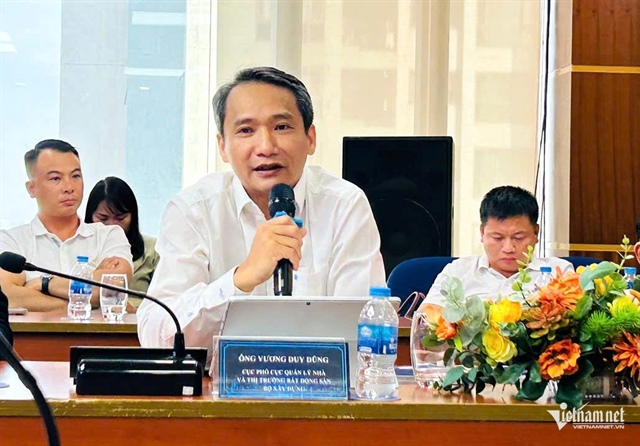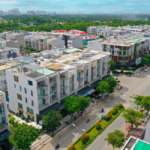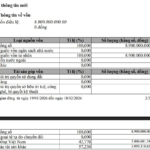Series of Warnings
At the seminar titled “Vietnam’s Real Estate Market: Identifying Inefficiencies and Solutions” on the afternoon of October 16, Dr. Can Van Luc, Chief Economist at BIDV and a member of the Prime Minister’s Policy Advisory Council, stated that soaring property prices are making it increasingly difficult for citizens to afford housing.
The expert highlighted several factors driving the surge in housing prices: legal bottlenecks and fear of accountability leading to a scarce supply; rising input costs; supply-demand imbalances; speculative price manipulation creating a gap between real and inflated prices; and widespread speculation, with 80% of transactions being resold within a year…
Regarding the Ministry of Construction’s proposal to restrict second and third home loans, Dr. Luc advised careful study and a phased implementation to avoid a sudden market shock. However, he believes such measures may be necessary in the long term.

Experts identify multiple causes of rising housing prices and propose solutions. Photo: N.L
|
Dr. Nguyen Minh Phong, an economist, issued a series of warnings about the real estate market. He noted that the overheating of credit and bond markets poses significant risks, with mounting debt and repayment pressures. Without proper management, new loans combined with unresolved old debts could escalate financial risks.
While the housing supply is increasing, most properties exceed the affordability of middle- and low-income earners, indicating growing speculation and short-term trading, which heightens the risk of a market bubble.
Dr. Phong also warned of the risk of widespread property price reductions as payment deadlines approach, given the increasing volume of loans and collateralized assets.
“If gold and property prices continue to rise in tandem, both could collapse simultaneously in the future,” the expert cautioned.
Additionally, challenges include halted projects awaiting post-merger planning approvals, fear of accountability, and the rapid growth of digital assets and gold trading platforms.
Dr. Nguyen Minh Phong further noted that policy factors, such as delayed approvals for new projects and market-based land pricing, could drive land prices higher. The upcoming implementation of property transfer taxes will also significantly impact the market.
Key to Cooling Property Prices
Mr. Vuong Duy Dung, Deputy Director of the Department of Housing and Real Estate Market Management (Ministry of Construction), reported that the real estate market has been recovering with positive signs since the beginning of the year. Specifically, the number of newly approved projects is rising. Many previously stalled projects have been resolved under the Government’s Steering Committee, increasing supply.
Investor and public confidence has improved, reflected in higher transaction volumes and liquidity. Credit, bond, and FDI flows into real estate are stabilizing positively.
 The Deputy Director of the Department of Housing and Real Estate Market Management emphasizes reducing input costs to cool property prices. Photo: N.L |
According to Mr. Dung, the Government and Prime Minister are focusing on two major issues: skyrocketing property prices and supply-demand mismatches. To address high housing costs, it is essential to accurately assess the structure of property pricing.
Mr. Dung explained that property prices depend on factors like land use costs, construction expenses, infrastructure investment, interest payments, and marketing costs. Capital costs, which constitute a significant portion, increase with longer project durations.
Therefore, the key solution, as suggested by the Department of Housing and Real Estate Market Management, is to reduce input costs. This requires further streamlining administrative procedures in investment and construction, shortening project timelines, and lowering capital and compliance costs for businesses.
“Only when input costs decrease can property prices genuinely cool down,” Mr. Dung emphasized.
Additionally, adjusting the supply-demand structure by focusing on affordable housing segments, particularly social housing, is crucial to meeting genuine public needs. The Prime Minister has tasked the Ministry of Construction with developing breakthrough policies for social housing from 2026 to 2030, aiming to increase supply, stabilize the market, and promote sustainable development.
“As the supply of affordable commercial housing increases, the market will gradually rebalance, helping to reduce property prices,” Mr. Dung affirmed.
Dr. Can Van Luc recommended that the government continue to refine land, construction, and real estate regulations, including promptly issuing resolutions to address issues related to the 2024 Land Law, the 2023 Real Estate Business Law, and the 2023 Housing Law. Feasible measures should be implemented to stabilize and reduce property prices. Consider allowing the conversion of surplus government offices into social housing or official residences.
Nguyen Le
– 07:22 17/10/2025
Top 10 Eligible Housing Projects for Sale in Da Nang
The Da Nang Department of Construction has released an updated list of real estate projects eligible for the sale of future housing units, effective from August 2024 onwards. This announcement highlights the legal requirements for customer payment collection within these projects, ensuring compliance with Vietnamese regulations.
Ho Chi Minh City Urges Real Estate Firms to Avoid Authorizing Deposit and Purchase Contracts
The Ho Chi Minh City Department of Construction mandates that real estate developers must publicly disclose project information and prohibits the delegation of authority to individuals or organizations to sign deposit, purchase, or transfer contracts.
Ho Chi Minh City: Low-Income Housing Projects Without Land Funds Still Eligible for Land Titles
To resolve the issue, Task Force 5013 recommends that Ho Chi Minh City issue pink books for commercial apartments no longer subject to low-income housing obligations under Directive No. 07 – 2003. Simultaneously, a financial obligation review should be conducted to definitively address disputed projects.



















